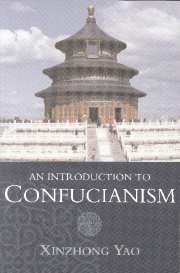Book contents
- Frontmatter
- Contents
- List of illustrations
- Preface
- Confucianism in history: chronological table
- Introduction: Confucian studies East and West
- 1 Confucianism, Confucius and Confucian classics
- 2 Evolution and transformation – a historical perspective
- 3 The Way of Confucianism
- 4 Ritual and religious practice
- 5 Confucianism and its modern relevance
- Select bibliography
- Transliteration table
- Index
- Plate section
4 - Ritual and religious practice
Published online by Cambridge University Press: 05 June 2012
- Frontmatter
- Contents
- List of illustrations
- Preface
- Confucianism in history: chronological table
- Introduction: Confucian studies East and West
- 1 Confucianism, Confucius and Confucian classics
- 2 Evolution and transformation – a historical perspective
- 3 The Way of Confucianism
- 4 Ritual and religious practice
- 5 Confucianism and its modern relevance
- Select bibliography
- Transliteration table
- Index
- Plate section
Summary
The Confucian understanding of ritual and the Confucian practice of spiritual cultivation reveal the distinctiveness of Confucian religiosity. The co-existence of Confucianism with other religious traditions has enabled Confucians to engage in dynamic dialogue with many different doctrines. This enriches Confucian religio-ethics on the one hand and cultivates a syncretic culture on the other hand. To examine the spiritual dimension of the Confucian tradition, therefore, we shall look into three areas of Confucian practice. Firstly, we shall explore how Confucianism was involved in grand religious sacrifice and its contribution to the formation and transformation of the state religion. Collective and official ritual is but one aspect of Confucian religiosity, and individual Confucians also actively engage themselves in a range of spiritual practices, in which a sense of eternity and transcendence is sought through the pursuit of secular learning and personal discipline. In the second section of this chapter, therefore, we shall come to examine how individual Confucians endeavour to bridge the temporal and the eternal through learning and spiritual cultivation. Confucianism has existed and functioned in the context of a multireligious society and its intercourse with other religious traditions, such as Daoism, Buddhism and more recently Christianity, not only has an impact on its own doctrines and practices but also exerts a great deal of influence over these traditions.
Information
- Type
- Chapter
- Information
- An Introduction to Confucianism , pp. 190 - 244Publisher: Cambridge University PressPrint publication year: 2000
